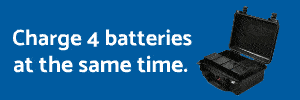Hi Guys,
I'm doing some boat work and I am told there is a 'small 240V' inverter aboard and a 12V. When they they 'small' should I be checking the output of it before assuming it will charge my inspire batteries?
It's 12 days on a boat so praying it works!
Thanks,
I'm doing some boat work and I am told there is a 'small 240V' inverter aboard and a 12V. When they they 'small' should I be checking the output of it before assuming it will charge my inspire batteries?
It's 12 days on a boat so praying it works!
Thanks,






